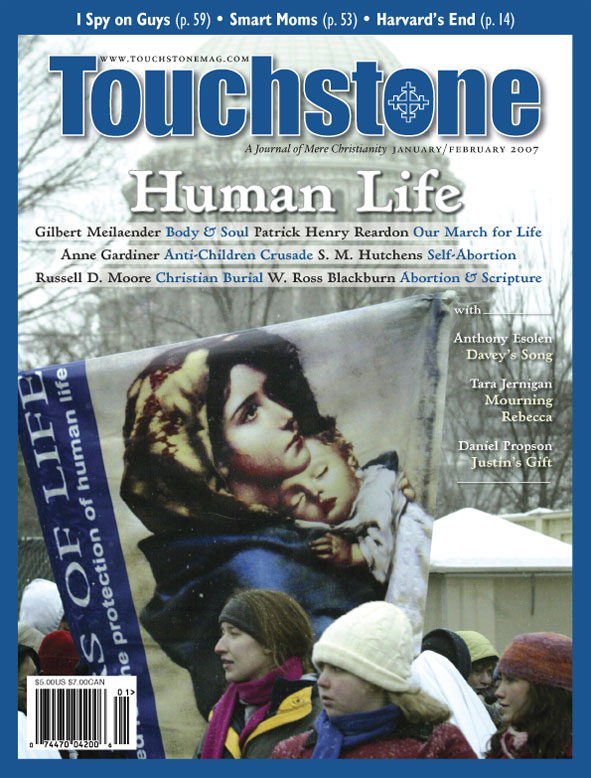Grave Signs
Russell D. Moore on the Godly Waste of Christian Burial
I knew my grandfather’s funeral wouldn’t be elaborate or expensive. He was a big-hearted Baptist, generous with his grandchildren but spending little on himself. This was a man who refused the “luxury” of air-conditioning in south Mississippi, a place where most people consider air-conditioning a necessity.
He left instructions that he didn’t want anyone spending money on a casket, embalming fluid, or an elaborate funeral. He wanted to be cremated, the cheapest way possible to dispose of his earthly remains. No one asked my opinion on this, but I wept bitterly at the thought of this great man being reduced to ashes in the twinkling of an eye.
I could understand my grandfather’s request. He was a practical man who wanted to save money for his family. And the financial racket of cushioned caskets, catered “celebration services,” and steel-vaulted graves is a scandal, to be sure. What I couldn’t understand was how few of my fellow Christians joined in my horror at the thought of a Christian man’s cremation.
Of all the issues of controversy among Christians, I find few more incendiary than whether or not we should, well, incinerate the bodies of our loved ones. I find that Christians become agitated, defensive, and personally insulted more quickly on the question of cremation than on almost any other contemporary question. And I find this odd.
A Christian burial seems, in this culture, more and more nonsensical: a waste of money, a waste of otherwise usable land, a waste, perhaps, even of emotion, as we try to “hold on to the past” and fail to “move through our grief and get on with life.” But if someone had asked any previous generation of Christians or of pagans if cremation were a Christian act, the answer would have seemed obvious to them, whether they were believers or infidels: Christians bury their dead.
Today, however, an anti-cremation stance is often ridiculed by Christians as, at best, Luddite and, at worst, carnal. When I counsel a family to reject the funeral director’s cremation option, I am often asked: “Can’t God raise a cremated Christian just as he can raise a decomposed buried Christian?” The question is more complicated than whether God can reconstitute ashes. Of course he can. The question is whether we should put him in a position of having to do so in the first place.
Better to Bury or to Burn?
Stephen Prothero’s landmark study, Purified by Fire: A History of Cremation in America, demonstrates that cremation flourished before Christianity and withered away when the Church spread through Europe and beyond. Prothero argues that cremation was virtually unknown in early America, its proponents limited to anti-Christian “freethinkers” who saw in the act of cremation a defiant rejection of the resurrection of the body.
Most Christian cremation proponents dismiss the history of cremation ideology as irrelevant to the discussion, as simply a version of the genetic fallacy. After all, few Christians cremate with any thought of nineteenth-century debates, much less of ancient paganisms.
And the Church has toned down its previous horror at the thought of cremation. The Catholic Church, for instance, lifted its formal disapproval of cremation, stating in the Catechism of the Catholic Church, “The Church permits cremation, provided that it does not demonstrate a denial of faith in the resurrection of the body.” And the “freethinkers” among us are consumed with other things these days than funeral rites.
Russell D. Moore is president of the Ethics and Religious Liberty Commission of the Southern Baptist Convention. He is a senior editor of Touchstone.
subscription options
Order
Print/Online Subscription

Get six issues (one year) of Touchstone PLUS full online access including pdf downloads for only $39.95. That's only $3.34 per month!
Order
Online Only
Subscription

Get a one-year full-access subscription to the Touchstone online archives for only $19.95. That's only $1.66 per month!
bulk subscriptions
Order Touchstone subscriptions in bulk and save $10 per sub! Each subscription includes 6 issues of Touchstone plus full online access to touchstonemag.com—including archives, videos, and pdf downloads of recent issues for only $29.95 each! Great for churches or study groups.
Transactions will be processed on a secure server.
more from the online archives
calling all readers
Please Donate
"There are magazines worth reading but few worth saving . . . Touchstone is just such a magazine."
—Alice von Hildebrand
"Here we do not concede one square millimeter of territory to falsehood, folly, contemporary sentimentality, or fashion. We speak the truth, and let God be our judge. . . . Touchstone is the one committedly Christian conservative journal."
—Anthony Esolen, Touchstone senior editor









